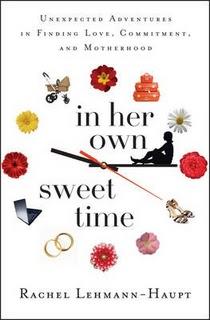In Her Own Sweet Time: One Woman's Unexpected Adventures in Finding Love, Commitment, and Motherhood

I read this book in one day. It, like the author, and like the problems she explores, is not perfect. Like the author, In Her Own Sweet Time is lovable and I eagerly devoured it for the stories she tells, the problems she outlines, and the social phenomena she identifies.
The question “What is the impact of new reproductive technologies (NRTs) on feminism?" is a recurring motif within this book. On the one hand, women have the unprecedented opportunity to choose when and how to become mothers—with a partner, with donor sperm, through intrauterine insemination, through in vitro fertilization or with the help of a surrogate. Women can freeze eggs at the peak of fertility for later use, and can freeze fertilized eggs for transplantation. Lehmann-Haupt describes all of these reproductive tools and her experience with them. I was delighted to see her go further and wonder about how they relate to feminism—its history, aims, and future. Women are ‘liberated’ to do it all and "on our own" (for "on our own" read: with an entire medical team. Ahem). The author wants to know whether is it okay—whether is it feminist—to want a partner, to desire love, and to hope for relationship and commitment.
Lehmann-Haupt does unwittingly import some of the old liberal feminist zero-sum assumptions about gender, which blunts the edge of her musing on the relationship between NRTs and feminism. Here, like many 1980s feminists that argued access to abortion makes women more like men and may be problematic to feminism, Lehmann-Haupt wonders if access to NRTs makes women more like men, and so may be problematic to feminism. Both arguments claim that the procedures in question—abortion and NRTs—allow women to deny their biological nature. It’s a convoluted syllogism: women's biological nature includes motherhood; men's biological nature does not include motherhood; when women act against their biological nature to preclude motherhood they are (acting) like men. No, it's not perfect, but hey, it's not my logic.
The fact that Lehmann-Haupt makes such a claim (that egg freezing allows women to deny their biological nature) now, decades past the Sex Wars of the 1980s and all of those old essentialism debates and appears unaware of the problems of this claim is noteworthy. It indicates that the question and meaning of nature is still a problem for feminism, and therefore, for American culture generally. There is still difficulty in developing a robust conception of what woman is and can be that allows for motherhood, but does not require it for "real" womanhood.
That being said, I definitely recommend In Her Own Sweet Time. It is refreshing to read about a woman who is struggling with questions about commitment, love, motherhood, technology, and feminism, and who is able to live with those struggles, say imperfect (but often very good) things, go on safari, travel with friends, date and cope with disappointment, and take her own sweet time with all of it.